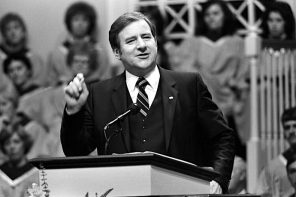Anyone who maintains at this late hour that the blogosphere has no intellectual depth has rocks in their head. (They also need to read the Immanent Frame, but that’s another story.)
There are all kinds of probing theoretical essays one could mention, and plenty of substantive posts that put many critics in the dead-tree media to shame. But I want to pluck out just one example of a conversation I contributed to, and amplify my remarks a little.
The other night, Paul Rosenberg at OpenLeft took to task a Daily Kos diarist using the handle AZDem. Rosenberg laid into AZDem for promoting “High Broderism,” among other things. Those other things include a false sense of “Niebuhrian humility” in the face of the Bush Administration’s daunting certainty. Said AZDem:
President Obama’s favorite theologian, Reinhold Niebuhr, famously posited that
if you and I disagree, then at least one of us is wrong, and it may be me.
That’s known to historians and political scientists as “Niebuhrian humility.”
And Niebuhrian humility is true liberalism.
We are very fortunate to be led by a President with Niebuhrian humility. Conservatives may see humility as “apologizing for America,” or as lack of conviction in American exceptionalism, but humility is what, ultimately, saves us.
Rosenberg responded at some length, opposing Niebuhrian theological humility to a scientific decision-making process that sorts out good options and bad even before decision makers use appropriate caution in choosing the path forward. The institutionalization of checks and balances, Rosenberg argues, is the essence of liberalism.
I’ll leave it up to you to decide whether Rosenberg is being fair to AZDem. What I want to say here is that neither of them are being particularly accurate in how they pick up on Niebuhr’s concept of humility.
“Niebuhrian humility,” after all, is not simply the understanding that we may be wrong, but the understanding that though we intend to do good, our actions will inevitably result in evil. That was not an excuse for inaction, according to Niebuhr, but the realistic acceptance that our perspectives and ability to understand the right path was inevitably flawed, often in ways that eluded conscious recognition.
In that perception, he was roughly in line with Heisenberg’s principle of uncertainty, and anticipated much of the post-modern critique of objectivity. Niebuhr was certainly critical of scientific or technical hubris. For him, it wasn’t possible to solve our way out of the world’s problems through better science or more scientific government. That’s the neo-orthodox piece of his argument, over and against the Christian liberalism that led us into World War I.
But humility for Niebuhr was always a moral claim, not so much an assertion about our critical or perceptual faculties. At the center of his argument is a specific critique of ideology. Niebuhrian humility springs from his involvement—and later distancing from—unions and the pacifist movement. He came to realize as his thinking developed that it was far easier to act as a moral individual than as the representative of a group. Individuals are much freer to act against their own interests than are groups, and their perspectives can shift much more easily to accommodate new information.
For Niebuhr, this led to the conclusion that no ideology could be complete unto itself. To use his example from Moral Man and Immoral Society, though union representation of their workers is a good and healthy thing, it should not be mistaken for a transcendent good. Unions can and do maximize their interests to the detriment of other participants in an economy.
In a social setting, this meant that all ideologies were vital, though not necessarily equal. Unions, for example, might not be inherently moral, but they could be preferred to oligarchy. Furthermore, the theological claim was that no one ideology could claim to represent God’s will—that was Niebuhr’s critique of the positivism of the Social Gospel movement.
Niebuhr’s opposition to pure ideology is an explicit basis for the bipartisanship of what liberal bloggers like to call the Villagers, the permanent caste of inside-the-beltway media and political elites. David Brooks and E.J. Dionne, among others, have been very clear on this point. Niebuhr’s ideas also turn up in Obama’s “cabinet of rivals.” The thinking goes that without all perspectives represented, good policy cannot be complete.
This drives highly ideological liberal bloggers nuts. They point out—rightly, in my opinion—that the Villagers are unable to understand the false equivalence they give to right and left and that they are unable to understand that not all the ideas presented to them are as liberal or conservative as they purport to be. They’re parochial, in other words. But they also believe themselves to be fairly representing all perspectives when they are in fact not. They try to set themselves up as dispassionate umpires rising above the partisan fray in the spirit of Niebuhrian humility, when Niebuhr himself would tell them that they were just as prone to error as anyone else.
Again, I’ll leave it up to my readers to decide if this is fair to the Villagers or not. I will say that after eight years of George W. Bush’s reign of error, calls for a more technocratic form of government sound welcome.
I will also say this much. Rosenberg says that:
Obama’s insistence on superficial “open-mindedness” without respect to demonstable falsehood is a perversion of the value of Niebuhrian humility in the grand scheme of things. At the same time, he has demonstrated a striking lack of similarly open-mindedness to the voices of many progressive forces that actually supported his election.
He’s not happy with the way things are going, but for better or worse, it shows the system is working in fine Niebuhrian fashion. Niebuhr was sharply aware of (and often amused by) the shortcomings of political leaders. They were only human, after all. But he also believed that humility was not simply a personal virtue, but something thrust upon leaders by the unending pressure of competing interests in the democratic process. That, for him, was the greatest check and balance available this side of Judgment Day.




